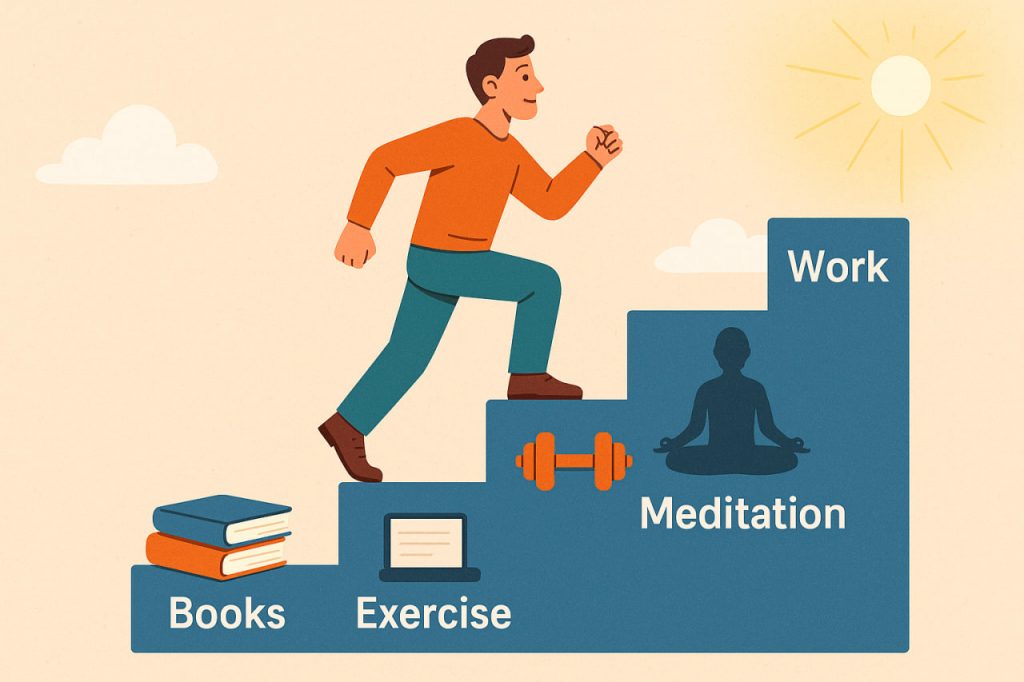Self-improvement is a lifelong journey — the continuous process of developing your skills, mindset, and emotional well-being to live a more meaningful and fulfilling life. It is not about perfection, but about progress: learning from mistakes, expanding your potential, and striving to become a better version of yourself every day.
The Philosophy of Self-Improvement
At its core, self-improvement is about self-awareness — understanding who you are, what you value, and what you want from life. The ancient Greek maxim “Know thyself” remains the foundation of personal growth. When you become aware of your strengths and weaknesses, you gain the power to change and direct your life consciously.
Philosophers and psychologists alike emphasize that growth begins with intentional effort. The process may be slow and challenging, but even small changes — a new habit, a positive thought, or a learned skill — gradually reshape both mind and character.
Key Areas of Self-Improvement
- Mental Development – Expanding knowledge through reading, studying, and critical thinking. Lifelong learning keeps the brain flexible and creativity alive.
- Emotional Growth – Understanding and managing emotions, practicing empathy, and building resilience to handle life’s ups and downs.
- Physical Health – Regular exercise, balanced nutrition, and rest form the physical foundation of self-improvement. A strong body supports a strong mind.
- Social Skills – Effective communication, active listening, and meaningful relationships foster confidence and belonging.
- Spiritual Awareness – Whether through religion, meditation, or reflection, spiritual growth helps find purpose and inner peace.
The Power of Habits
Habits are the building blocks of self-improvement. According to psychological research, consistent small actions lead to lasting transformation. For instance:
- Reading 10 pages a day equals 15–20 books a year.
- Walking 30 minutes daily strengthens both body and mind.
- Writing a gratitude list every evening cultivates optimism. Starting your day with sincere gratitude to God will make your day happy.
The key is consistency, not perfection. Over time, positive routines reprogram your subconscious and shape a stronger, more disciplined personality.
The Role of Failure in Growth
True growth cannot exist without failure. Every setback provides valuable lessons — revealing weaknesses to strengthen and paths to avoid. History’s greatest innovators, from Thomas Edison to Steve Jobs, viewed failure not as defeat, but as feedback.
Learning to accept mistakes with humility and curiosity transforms obstacles into stepping stones. The courage to begin again, even after falling, is one of the purest forms of self-improvement.
The Science of Mindset
Psychologist Carol Dweck introduced the concept of the growth mindset — the belief that intelligence and abilities can be developed through effort and learning. In contrast, a fixed mindset assumes that traits are unchangeable.
People with a growth mindset embrace challenges, persist through difficulties, and celebrate progress rather than perfection. Adopting this mindset can radically improve confidence, motivation, and life satisfaction.
Modern Tools for Personal Growth
Today’s technology offers new ways to pursue self-improvement:
- Meditation apps and AI coaches guide mindfulness practice.
- Online courses make knowledge universally accessible.
- Journaling apps help track goals, habits, and emotions.
- Wearable devices monitor health, encouraging consistency.
While technology is a useful tool, the most important element of growth remains internal — discipline, curiosity, and self-reflection.
The Balance Between Ambition and Self-Acceptance
Self-improvement is not about constant dissatisfaction or competition. It’s about finding balance between who you are and who you can become. Accepting yourself doesn’t mean stopping growth — it means nurturing it from a place of love, not judgment.
Lasting change happens when you respect your journey, celebrate progress, and understand that growth is infinite — not a destination, but a way of life.
Interesting Facts
- Studies show that people who write down their goals are 42% more likely to achieve them.
- It takes an average of 21-66 days to form a new habit.
- Practicing gratitude for just five minutes a day can improve mental health and reduce stress.
- Meditation has been shown to increase overall health dramatically.
P.S. I believe that God created us and gave us a soul so that we could become Humans. What do you think?
Glossary
- Growth mindset — the belief that abilities can be developed through dedication and learning.
- Resilience — the ability to recover quickly from challenges or setbacks.
- Self-awareness — conscious understanding of one’s emotions, motivations, and behavior.
- Habit loop — a psychological pattern consisting of cue, routine, and reward.
- Mindfulness — the practice of being fully present and aware in the current moment.


